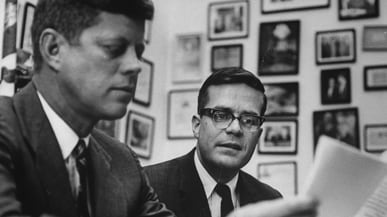There’s an old saying, attributed to Montaigne, that no man is a hero to his valet; that when you come to know a person, to see a man, warts and all, he appears smaller somehow, less worthy of admiration. I suppose that may be true in some cases. It’s certainly not true in mine.
I got to know Ted—or “sir,” as I always called him—when I was a junior in college. He’d just had his first stroke—a stroke that instilled in him a new sense of urgency about writing his memoirs, even as it deprived him of the eyesight necessary to write them on his own.
Over the next six years, I helped, as he set out to do what, at times, seemed impossible, dictating, from handwritten notes he strained to read, a book of memories he saw clearly in his mind. His courage, his resolve, were as inspiring as any words he ever wrote.
ADVERTISEMENT
In time, a man I’d known only as an icon of the New Frontier, as a speechwriter, blessed with the glory of words, who set the standard for all who followed—that man became a treasured mentor. And that treasured mentor, in time, became one of my closest friends, always there with advice or a story, always chiding me, always candid.
He once called me after receiving a memo he’d asked for on President Kennedy’s approach to foreign policy. “Adam,” he said, “at the law firm, we believe in something called feedback. It is in that spirit that I tell you, your memo on JFK’s foreign policy was…not very helpful.”
Going through Ted’s files one day at Paul Weiss, I came across a folder with everything he’d written about JFK since leaving the White House in 1964. Each and every year, decade in, decade out, on any relevant anniversary, Ted would write an article, or an op-ed, or a speech, reminding America about the legacy of the President he served, inspiring one generation after another to believe, as he did, in John F. Kennedy.
Consider the devotion that that required—the love. It reflected, of course, loyalty to a friend he still missed—fierce loyalty that seems almost quaint today. But in a larger sense, it reflected an adherence to ideals they shared; a fidelity to the commands of conscience, from his early years in Lincoln, until, to quote his favorite poet, he shuffled off this mortal coil.
Long before he opposed the Iraq war or pressed for the path of peace during the Cuban Missile Crisis, Ted registered with his draft board as a conscientious objector; a pacifist. Long before he stood by our country’s first black president or wrote a speech calling civil rights a moral issue as old as the Scriptures, he led interracial sit-ins, integrating Nebraska. He was, as FDR called one of Ted’s lifelong heroes, Nebraska Senator George W. Norris, “the very perfect gentle knight of American progressive ideals.”

And yet, what made Ted, as he put it, a counselor was not idealism, but judgment, hard-nosed and clear-eyed; a skeptical, relentlessly rational way of seeing the world and making it better. That hard-headedness, combined with that sense of loyalty, is why every President wants their own Ted Sorensen. That idealism, combined with the good fortune to find a president who shares it, is why, even now, nearly a half century later, every newcomer to Washington wants to be Ted Sorensen.
A few days before Ted passed away, I was sitting by his hospital bed, talking with him, stroking his hand, letting him know I was there. He was having these moments of clarity, where he’d say a few words before sinking back into the fog. In one of those moments, the last I saw, Ted spoke up clearly, loudly, like he wanted to be heard. He said, “It’s the end. That’s all. Goodbye.”
I was startled. He’d been saying a few words here and there, but until then, nothing that carried any meaning, nothing that showed any recognition of what was happening. I didn’t know what to say, but I felt an urge to say something. So, I took a deep breath, stared into his eyes, and replied the only way I could think of. Goodbye, sir.
Adam Frankel is a speechwriter for President Obama.






